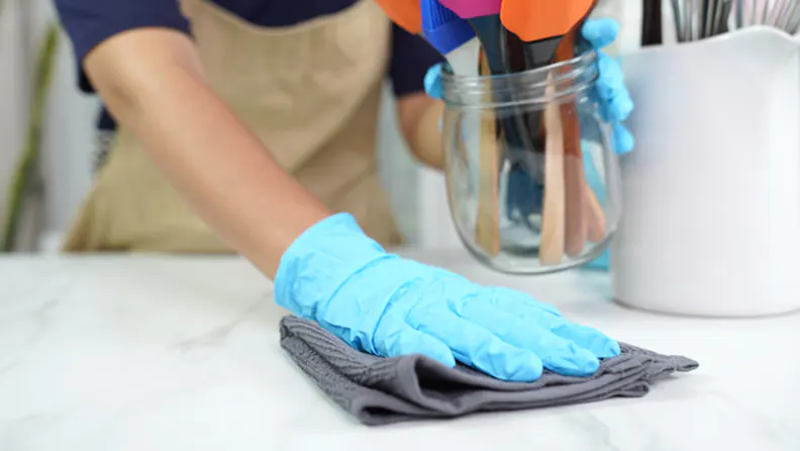Lowes loves your home as much as you do. With a Lowes Money Off Coupon from We Are Coupons you can save money on looking after your home. Quartzite countertops are a popular choice for kitchens and bathrooms due to their durability, beauty, and resistance to heat and stains. However, like any other countertop material, quartzite countertops require regular cleaning and maintenance to keep them looking their best. In this article, we will discuss how to clean quartzite countertops effectively to ensure they remain pristine and gleaming for years to come.
Quartzite is a natural stone that is formed from sandstone under high heat and pressure, resulting in a dense and durable material. It is composed mainly of quartz, which is one of the hardest minerals on Earth, making quartzite countertops resistant to scratches, chipping, and staining. Despite its durability, quartzite countertops can still be susceptible to damage if not properly cleaned and maintained.
Here are the steps to clean quartzite countertops:
Wipe Up Spills Immediately: Quartzite countertops are relatively resistant to staining, but it's still important to clean up spills as soon as possible to prevent potential damage. Use a soft cloth or paper towel to blot spills, rather than wiping or spreading them, to avoid spreading the liquid and causing stains.
Use a pH-Neutral Cleaner: When it comes to cleaning quartzite countertops, it's essential to avoid using acidic or abrasive cleaners, as they can damage the surface of the stone. Instead, opt for a pH-neutral cleaner that is specifically formulated for natural stone surfaces. Avoid using harsh chemicals, such as bleach or ammonia, as they can cause etching or discoloration.
Mix Cleaning Solution: To make a pH-neutral cleaning solution, mix warm water with a few drops of a gentle dish soap or a stone-specific cleaner in a spray bottle. Avoid using excessive amounts of soap, as it can leave a residue on the surface of the quartzite.
Clean the Countertops: Spray the cleaning solution onto the quartzite countertops and use a soft, non-abrasive cloth or a stone-safe brush to gently clean the surface. Avoid using abrasive scrub brushes or abrasive pads, as they can scratch the quartzite. Pay extra attention to areas that may have more grime or residue, such as around the stove or sink. Rinse the countertops thoroughly with clean water to remove any soap residue.
Dry the Countertops: After cleaning, be sure to dry the quartzite countertops thoroughly to prevent water spots or streaks. Use a clean, dry cloth or towel to wipe down the countertops until they are completely dry.
Address Stains: If you notice any stains on your quartzite countertops, it's essential to address them promptly. Common staining substances like red wine, coffee, or oil should be wiped up immediately to prevent them from seeping into the pores of the stone. If a stain has set in, you can create a poultice using a mixture of baking soda and water to draw out the stain. Apply the poultice to the stain, cover it with plastic wrap, and let it sit for 24-48 hours. Then, remove the poultice and rinse the area thoroughly with water before drying it.
Use Cutting Boards and Trivets: While quartzite countertops are durable, it's still important to use cutting boards and trivets to protect the surface from scratches and heat damage. Avoid placing hot pans or pots directly on the quartzite countertops, as extreme heat can cause thermal shock and potentially crack the stone.
Seal the Countertops: Although quartzite is a dense and durable stone, it is still porous and can benefit from regular sealing to protect it from stains and damage. Check with the manufacturer or your countertop installer for their recommendation on how often to seal your specific quartzite countertops, as different types of quartzite may require different sealing schedules. Use a high-quality sealer that is specifically formulated for natural stone surfaces and follow the manufacturer's instructions for application. Typically, the process involves cleaning the countertops thoroughly, applying the sealer evenly with a soft cloth or brush, allowing it to penetrate the stone for the recommended amount of time, and then wiping off any excess sealer. Sealing your quartzite countertops regularly can help maintain their beauty and protect them from potential stains and damage.
Avoid Common Culprits: To keep your quartzite countertops in pristine condition, it's important to avoid certain substances that can potentially damage the stone. Avoid using abrasive cleaners, acidic or citrus-based cleaners, or vinegar on your quartzite countertops, as they can cause etching or discoloration. Also, be cautious with certain foods and liquids that can stain or damage the stone, such as red wine, coffee, oil, and acidic fruits like lemon or tomato. If these substances come into contact with your countertops, clean them up immediately to prevent potential damage.
Regular Maintenance: In addition to regular cleaning, quartzite countertops also require some basic maintenance to keep them looking their best. Use cutting boards, trivets, and coasters to protect the countertops from scratches, heat, and moisture. Avoid dragging heavy objects or sharp utensils across the surface of the countertops, as they can potentially scratch or chip the stone. It's also a good practice to periodically check for any cracks, chips, or damage to the countertops and address them promptly to prevent further damage.
In conclusion, proper cleaning and maintenance are essential to keep your quartzite countertops in pristine condition. Regularly wiping up spills, using pH-neutral cleaners, avoiding abrasive or acidic substances, and sealing the countertops can help protect them from stains, damage, and discoloration. Using cutting boards, trivets, and coasters, and avoiding dragging heavy objects or sharp utensils across the surface can also prevent scratches and damage. Following these steps and incorporating regular maintenance into your cleaning routine will ensure that your quartzite countertops remain beautiful, durable, and functional for years to come.
It's also important to note that different quartzite countertops may have unique care and maintenance requirements, so always refer to the manufacturer's recommendations or consult with your countertop installer for specific instructions on how to clean and maintain your particular quartzite countertops. By following these guidelines and caring for your quartzite countertops properly, you can enjoy their beauty and functionality for many years to come, making them a worthwhile investment for your home. With regular cleaning, maintenance, and care, your quartzite countertops will continue to shine and be the focal point of your kitchen or bathroom for years to come.




